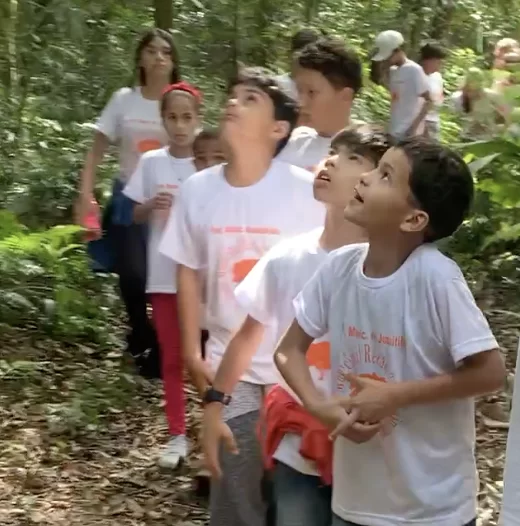
This semester, 300 elementary school students from Juquitiba had the opportunity to reconnect with nature amidst the Atlantic Forest, a brazilian gem just 70 km from São Paulo.
An immersive experience of knowledge and connection with nature amid the lush Atlantic Rainforest, one of the most biodiverse biomes on the planet, and home for 70% of the brazilian population. This spring, students from the municipal school system enjoyed a ‘forest bathing’ — also known as forest therapy — in Juquitiba, one of the brazilian cities with the highest vegetation coverage, located just a few kilometers from São Paulo, the most populous city in the Southern Hemisphere.
Coordinated by the Luminous Earth Institute (ITL) in partnership with the Municipal Department of Education and Culture, the EcoLab project connects the new generations to this precious biome, in a preserved stretch of the Atlantic Forest right in the central region of the municipality.
The project kicked off with the arrival of spring at the end of September, bringing over 300 students from the 4th to the 9th grade of elementary school, along with 130 educators, to the recently revitalized Juquitiba Ecological Park. The activity combines forest therapy and environmental education, and was made possible with the support of the local business sector in Juquitiba.
Eleven-year-old Damaris da Silva Pinto says she will take away an important lesson from the visit: “I loved all this nature, but to preserve it, it is very important that people stop littering in the water and on the ground.”
The Ecological Park is located along the São Lourenço River and is part of one of the most important sets of water sources for the water supply in the state. The São Lourenço System, managed by Sabesp, is the main water source for 2.5 million residents in the southern and southwestern regions of the São Paulo Metropolitan Area.
“To have good water, it is necessary to preserve the forest, but this is just one of the countless benefits that children can perceive by walking a trail among the trees, sharpening their senses and paying attention to uncommon stimuli in their daily lives,” explains Glenn Suba, executive director of ITL.
Showing the series of benefits that standing forests offer to humans—the so-called ecosystem services—is one of the main objectives of the project. It started as a pilot last year with students from a public school near ITL and is now extended to the entire municipal school system. “By visiting the forest, children are enchanted and can understand, in practice, the importance of preserving nature to ensure fundamental things for life, such as clean air, clean water, and a more predictable climate,” says Glenn.
Systematized in Japan since the 1980s and adopted as an effective form of stress reduction, the forest bath provides relief from the excess distractions of urban life. This is because it situates participants amid the subtle diversity of stimuli and forms of life encountered on a forest walk. Alternating between moments of guidance and silence, the practice allows an experience of ‘reconnection’ with nature. During this time, participants discover new meanings in their relationship with the surrounding environment, other living beings, and their own feelings and emotions.
For educators, in addition to forest therapy and outdoor lessons on the importance of forests in sustaining human life, the experience serves as a laboratory for their training as environmental educators. The mission of these professionals is to help preserve the Atlantic Forest in one of the most threatened stretches of this biome.
One of them is Nika Machado, 53, a public school teacher for over 30 years, who takes her students to the park every year. “Environmental education is not about preparing for the future; it’s for now. It is urgent for humanity to understand the relationship between consumption, waste disposal, and sustainability.”
Juquitiba has 100% of its territory in a protected watershed area according to state legislation. The region is also considered a UNESCO Biosphere Reserve and is the habitat for threatened species such as the jaguar, tapir, and juçara palm.
However, despite having one of the highest vegetation coverage rates in São Paulo, Juquitiba falls below the state average in the Human Development Index (HDI). The city offers few income opportunities, and a large portion of the population is in a vulnerable situation. Rapid urban growth, driven by the real estate expansion of Greater São Paulo, poses a threat to its green areas due to land fragmentation, irregular settlements, deforestation, and predatory exploitation of natural resources.
These threats limit the municipality’s ability to fulfill its natural vocation as a provider of ecosystem services, such as water supply, climate regulation, and nature tourism. “Ecotourism, in particular, has enormous potential to boost the socio-economic development of this region and curb the current model of real estate exploitation and natural resource exploitation,” explains Rafael Oliveira, EcoLab project coordinator for ITL. “It is to cultivate this vision of the future among the younger generations that the project was born. The protection of the forests depends on them.”